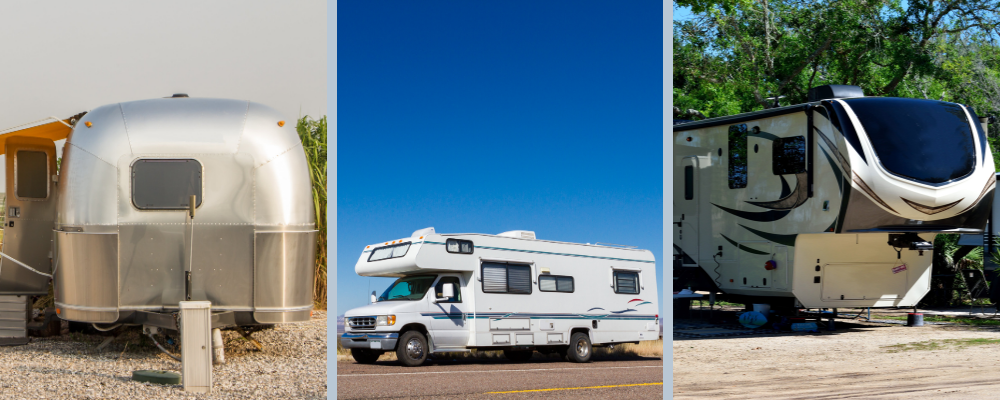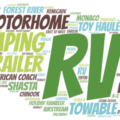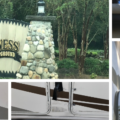Determining the best class of RV to purchase depends on many factors. Lifestyle along with how you expect to use the RV will help narrow down the choices. Do you intend to be a weekend warrior or use it several weeks a year? Are you considering longer, extended trips, or even full-time? Also, how many people will be regularly traveling? These are just a few of the considerations before making an RV purchase. After you’ve answered these questions, it will naturally start narrowing down the choices. For additional questions to consider, be sure to check out the Top 4 Questions to Answer When Considering an RV Purchase
Following is a brief outline of the various RV types, along with their target audience. More in-depth information can be found in the related articles section below.
Class A

Whether it’s gas or diesel, singles, couples, and families up to 6 people will enjoy being in a self-contained unit complete with a bathroom and kitchen. Remember, when you view a Class A, the slides will likely be out and seem very roomy. Be sure to ask the owner or salesperson to pull the slides in so you can see what space will be like when traveling. Also, check there are enough seat belts and comfortable seating for everyone while on the road.
Class B
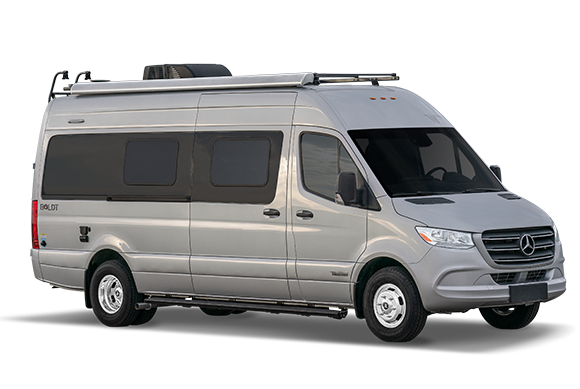
These small, typically self-contained units are perfect for singles or couples looking for an easy-to-drive option to get out on the road. Class B can be parked virtually anywhere and are much easier to maneuver on busy city streets.
Class C
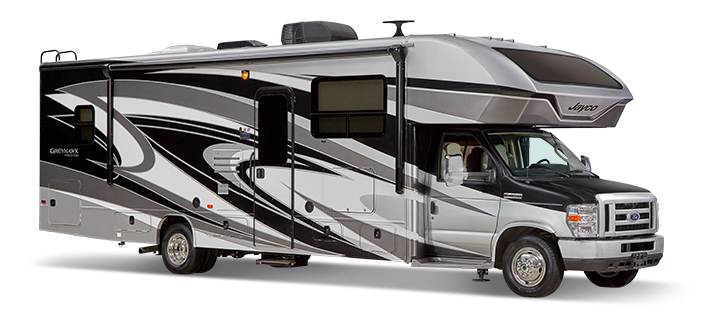
The crossover of motorhomes fitting in the middle between Class A and B. Class C is built on a van chassis and very easy to drive. However, be aware of the added height and length compared to driving a van or domestic truck. Also self-contained with a bathroom, kitchen, and sleeping areas for up to 6 people. Class C is a great option for looking for all the amenities of a driveable unit but without the size and expense of a Class A coach.
Towable and Fifth Wheel
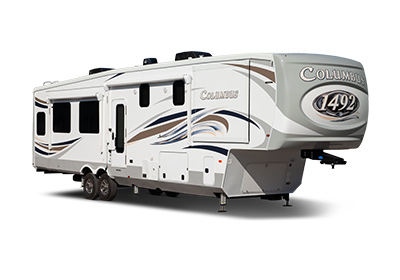
These units are great for families of all sizes who want the flexibility of always having a car or truck to drive around the local area. Most towables and fifth wheels comfortably sleep up to 6 people, with some larger units available. For example, one unit offered by Venture RV (the 312 VBH bunkhouse mode) can sleep up to 15, including nine in a bunkroom. Towables come in all sizes, from the small 1 or 2 person teardrop and pop-up campers (no bathroom and limited if any kitchen) to the larger sizes complete with slides, kitchen, bathroom (or two), and all the amenities of motorhomes.
Final Thoughts
There are no right or wrong answers, but finding the right unit can take some time and patience. Right now (Summer 2020), the RV market is booming, and prices are at an all-time high. During Covid, it’s definitely the right time to be an RV salesperson or dealership owner, as sales have been skyrocketing. However, with that in mind, it’s not necessarily the best time to buy an RV. With so many travel options closed or limited right now, the masses are turning to RVing. Camping is a safe vacation alternative to getting on planes and staying in hotels. Couple the increased demand with decreased production at the factories due to social distancing and other COVID-related precautions. This perfect storm creates inventory problems and a lot fewer deals or special offers.
The upside to the current seller’s market makes it a great time to sell your unit. Just remember, while it may be a seller’s market right now, it likely won’t last long. As people go back to flying, staying at resorts and hotels, and cruising, the used RV sales market will be flooded mid-2021 and into 2022. When this happens, it will be a great time to upgrade your unit or purchase the unit you’ve always wanted.
If you find a unit that you love in the current seller’s market, and it’s at a good price, BUY IT! Even if you aren’t sure, put a deposit down to hold it while you work through the purchase and your budget details. Keep in mind that purchasing an RV is more than just the initial cost. There are a lot of ongoing costs such as maintenance and upkeep, insurance, storage, etc. Know what you are getting into before you jump in too deep.

